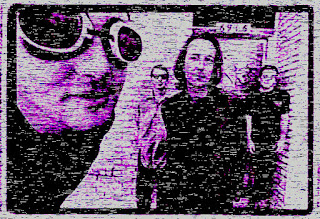The first time this writer heard "Standing Outside A Broken Phone Booth With Money In My Hand", I was almost certain that Karl Stephenson had done it again. Stephenson, of course, was the mad scientist behind Beck's "Loser", which, apropos of nothing, still sounds amazing 25 years later.
Once informed of the self-produced nature of the song and the artist's valiant escape from screaming obscurity, it was impossible to not begin rooting for singer/songwriter Chris O'Connor to enjoy his own Beck-like rise to stardom.
For those unfamiliar with the tale, after four self-released albums in as many years with the I-Rails failed to yield a major label deal, the band split and, in a fit of creative freedom, O'Connor recorded a full-length album under the name "Primative Radio Gods" (sic) that he then sent to radio stations in 1994 in hopes of attracting label interest through airplay.
When said airplay failed to materialize, O'Connor chucked the remaining CD's into a box in his closet and there they would sit for the next two years.
Rediscovering the stash of discs, O'Connor could have just closed the box and gone back to his life,but, instead, he decided to send the remaining copies to any record company whose address he could find.
It was the exact gambit that every expert on how to break into the music business will tell you is a waste of time: "Don't send your demo to labels unsolicited. It will be thrown directly in the trash. Nobody in the history of recorded music has ever been signed by just sending their demo to a record company."
Perhaps while listening to this song, you can set fire to any such "how to" books you might have in your collection.
While response to the song was lukewarm initially, a spike in airplay in the UK led the American arm of the Sony machine to re-pitch the song to radio. This time around, test spins in major markets resulted in fully-lit phone banks.
Much like the fervor surrounding the aforementioned "Loser", where heat at one radio station on the West Coast soon spread to other stations like a wildfire, O'Connor's tune was now a "story".
The mistake, in hindsight, was that Epic failed to put a face with that story.
Doing so would helped us realize that there was, indeed, a man behind the curtain and made the transition to "the next single" easier because everybody and their brother knew there was no other song on the album that sounded like "Phone Booth".
Not to drive this Beck comparison into the ground or anything, but Geffen succeeded at putting a face with the name during that brief window of us giving a damn and, last time we checked, folks are still lining up to see Beck.
O'Connor's mistake, of course, was having no second act.
In hindsight, it was a question he should have posed to himself right there in that closet the minute he started thinking about sending those demo CD's to record labels:
"Suppose I send this to, say, Epic Records and they sign me and one of my songs is a hit, THEN WHAT?"
O'Connor's whole plan, if you can call it that, was "to get the band that couldn't get signed" back together.
Huge mistake.
After all, O'Connor, in a burst of creativity brought on by his newfound freedom from those tiresome losers, we surmise, had discovered his inner rock star and recorded a song on his own that had now become a hit.
He was now breathing that rare air that all struggling nobodies crave and, in the small window of opportunity that had presented itself, should have told his label, and I quote: "Look, I love what you guys have been able to do with my naked baby photos, but this is where I'm at now: I want Butch Walker, Butch Vig and Paul Newman on my tour bus in 48 hours."
"WHY ARE YOU STILL STANDING THERE? GO!!!"
It had been ballsy to send those old demos out to labels instead of chucking them in the trash and it had paid off. O'Connor's only hope of surviving was to stay ballsy.
Touring with his old band and letting Epic send them around to a bunch of goofy radio stations and festivals was not ballsy.
At the very least, whoever thought it was a bright idea to release "Motherfucker" as second single should have their commissary privileges revoked.
Once it was obvious that O'Connor had his heart set on playing rock star with his I-Rails buddies, the only viable next single was the loud and loose "Where The Monkey Meets The Man", which could at least be reproduced live and would have respectfully distanced the band from "Phone Booth".
If that tune wasn't a hit, though, the ride would soon be over.
Of course, we'll never truly know whether there was anything O'Connor could have done to escape the cruel clutches of one-hit wonder-dom. The only question to be answered now is "Why isn't O'Connor out there on the tour circuit with a band of Primitive Hired Guns raking in some of that nostalgia cash?"
Tags:
gods of a feather

